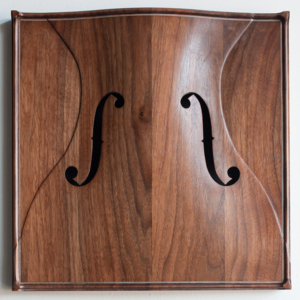November 5, 1893 – Savannah, Georgia
Description
Part of the “Soundless” series
"NOVEMBER 5, 1893 - SAVANNAH, GEORGIA
Love Sermon: On November 5, 1893, a prominent Baptist preacher gave a sermon condemning lynching, rape, and mob violence against African Americans in the South. In his sermon, Rev. Emmanuel K. Love of the First African Baptist Church in Savannah, Georgia advocated equality for all people, black and white. Fifteen hundred people attended the evening church service to hear the sermon given by Love. Love noted “the well-known fact that like begets like,” and warned that the outrageous acts of lynching would not stop any time soon. His plea was that “The sensible Negroes and conservative whites should unite and frown down these outrages. This can best be done by conservative talk, fair reasoning, confidence and patriotic cooperation.”"
Paul Rucker’s ongoing “Soundless Series” features panel of wood hand-carved by the artist to resemble cello bodies. The cello, an instrument the artist himself plays, has often been imagined as a metaphor for the human voice because of its range and intonation. Here, the strings which would give the cello voice and life are deliberately absent, resulting in an unplayable instrument with no existence beyond a visual object. Each work in the series is named with a date to mark a specific racially-motivated death or related event in American history. Unlike the other works in the “Soundless Series” that memorialize particular deaths, November 5th, 1893 references an event organized against violence. In this country, there is much of our history that we wish to make right, and Rucker teaches us that this history must be revisited before it can be transformed. November 5th, 1893 offers hope in this moment, in the context of a frightening and conflicted world, where racism appears to reinvent its own materialization each day.
Text written by Rachael Carruthers, Grace DeWitt, and Nick Duque
"NOVEMBER 5, 1893 - SAVANNAH, GEORGIA
Love Sermon: On November 5, 1893, a prominent Baptist preacher gave a sermon condemning lynching, rape, and mob violence against African Americans in the South. In his sermon, Rev. Emmanuel K. Love of the First African Baptist Church in Savannah, Georgia advocated equality for all people, black and white. Fifteen hundred people attended the evening church service to hear the sermon given by Love. Love noted “the well-known fact that like begets like,” and warned that the outrageous acts of lynching would not stop any time soon. His plea was that “The sensible Negroes and conservative whites should unite and frown down these outrages. This can best be done by conservative talk, fair reasoning, confidence and patriotic cooperation.”"
Paul Rucker’s ongoing “Soundless Series” features panel of wood hand-carved by the artist to resemble cello bodies. The cello, an instrument the artist himself plays, has often been imagined as a metaphor for the human voice because of its range and intonation. Here, the strings which would give the cello voice and life are deliberately absent, resulting in an unplayable instrument with no existence beyond a visual object. Each work in the series is named with a date to mark a specific racially-motivated death or related event in American history. Unlike the other works in the “Soundless Series” that memorialize particular deaths, November 5th, 1893 references an event organized against violence. In this country, there is much of our history that we wish to make right, and Rucker teaches us that this history must be revisited before it can be transformed. November 5th, 1893 offers hope in this moment, in the context of a frightening and conflicted world, where racism appears to reinvent its own materialization each day.
Text written by Rachael Carruthers, Grace DeWitt, and Nick Duque
Creator
Paul Rucker
Date
2015
Rights
Image courtesy of the artist
Original Format
Oak
Physical Dimensions
16in x 16in x 2in
Citation
Paul Rucker, “November 5, 1893 – Savannah, Georgia,” Contemporary Art Purchasing Program - Stamp Gallery, accessed June 7, 2025, https://contemporaryartumd.artinterp.org/omeka/items/show/112.

